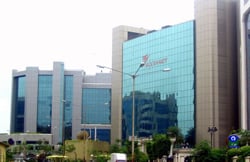 |
| Wockhardt's headquarters in Mumbai, India--Courtesy of Wockhardt |
Wockhardt has been in a world of hurt since the FDA last year banned two of the plants that made drugs for the U.S. market. But the Indian drugmaker has said that with the help of outside consultants it can get most of its problems with the FDA resolved within the year, and that has the M&A handicappers suggesting it is prime takeover target.
"If you're confident in your capabilities that you can turn around and manage the U.S. business in a high-quality manner, you can buy some of those assets at a relatively cheap price," Nitin Agarwal, a Mumbai-based analyst at IDFC, tells Bloomberg.
While Wockhardt officials insist it has no interest in selling, that has not stopped analysts from playing matchmaker, especially since execs at India's Lupin acknowledged recently that they analyzed whether buying Wockhardt would make sense. The analysts are suggesting some of the usual suspects: Teva Pharmaceutical Industries ($TEVA), Actavis ($ACT) and Mylan ($MYL), Bloomberg reports.
One of the big selling points for Wockhardt is its position in India, one of the faster growing global markets. Mylan already has lots of experience there and added to that with its $1.75 billion deal in 2013 to acquire the sterile manufacturing operations of Strides Arcolab.
But any buyer would have a steep hill to climb with the FDA, which last year banned Wockhardt's plants in Waluj and Chikalthana. The agency found many of the same problems at both facilities, faking test results and hiding data about batch failures. At Waluj there were also special sanitary concerns, like a toilet near the gowning area for the sterile manufacturing area where urine leaked from urinals and stood in a puddle near a drain. Mold and mildew were also found in the area. It said the plant had been warned about sanitation issues in the past.
The problems with those facilities prompted the FDA to put the company's plant in the U.S. under a microscope, and it recently issued a Form 483 outlining concerns there. That came after Managing Director Murtaza Khorakiwala in a call with analysts in February said Wockhardt "should be able to resolve most of the regulatory concerns" during the fiscal year ending next March.
Feeding the speculation, of course, is the fact that in April Sun Pharmaceutical struck an all-stock deal with Japan's Daiichi Sankyo to buy Ranbaxy Laboratories for $4 billion. Daiichi Sankyo owns controlling interest. Ranbaxy's problems with the FDA date back at least 6 years, when two plants were banned and later put under a consent decree. In the last year, the FDA added two more of Ranbaxy's FDA-approved plants to its import alert list. Sun officials have insisted that they can make the kinds of improvements needed to bring them into compliance and make its investment a winner.
- read the Bloomberg story